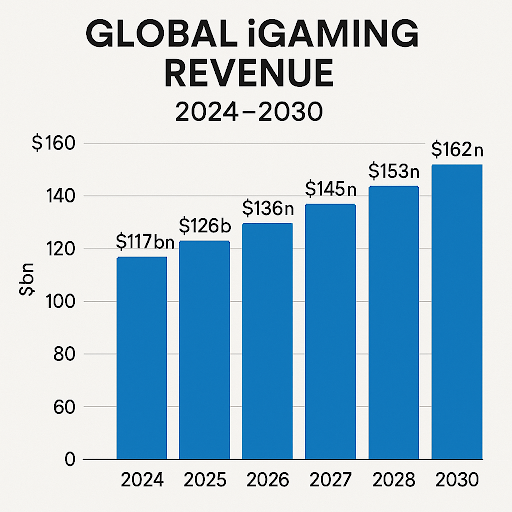The U.S. iGambling industry has exploded from zero to a multibillion-dollar market in just a few short years. Yet compared with the U.K., Europe, and Australia, it’s still in its infancy. Looking abroad offers a shortcut: mature markets have already faced-and fixed-the challenges the U.S. is now encountering. This piece highlights the most useful global lessons and how American operators can apply them to grow sustainably and responsibly.

In 2024, the U.S. online gambling market was valued at around $12.68 billion and is expected to expand at roughly a 9.8% CAGR from 2025 to 2030. Among the fastest-growing segments are live-dealer and immersive experiences. Meanwhile, the broader U.S. commercial gaming industry recorded record revenues in 2024, driven largely by iGaming and sports betting. These powerful growth trends bring both promise and pressure-particularly around advertising ethics, data privacy, and player protection.

| Aspect | U.S. Market | Europe / Australia Market |
| Regulatory Maturity | Fragmented, state-by-state, still developing | Centralized, well-established frameworks |
| Product Mix | Heavy sportsbook focus | Balanced mix: casino, poker, live dealer, social |
| Responsible Gambling (RG) | Early-stage, voluntary programs | Strict, mandatory standards and audits |
| Mobile Adoption | Rapid growth, improving UX | Mature, mobile-first environments |
| Data Utilization | Acquisition-driven | LTV-based personalization and retention |
In Europe and Australia, successful brands don’t rely on one vertical. They combine sportsbook, casino, live casino, poker, and social products to create stable, diversified ecosystems. U.S. operators should continue developing multi-product platforms that cross-sell smartly and smooth out seasonality.
Globally, mobile is where the vast majority of wagers happen. Seamless registration, lightning-fast KYC, real-time in-play UX, and instant deposits or withdrawals are now standard expectations. The key takeaway: minimize friction and latency, especially for micro-bets and live events.
The U.K.’s history proves that tools like self-exclusion, spend limits, and ad controls can’t be optional. Adopting responsible gambling frameworks early-along with data-driven harm detection-positions U.S. brands ahead of future regulation. Initiatives like the Responsible Online Gaming Association (ROGA) show where the industry is headed.
Winning on a global scale has always meant tailoring to local audiences-through payments, promotions, odds formats, and culture. The same holds true domestically: each U.S. state is effectively a separate market with unique taxes, ad rules, and bonus limits. Teams and reporting should reflect that.
For instance, New Jersey’s favorable tax structure contrasts sharply with Pennsylvania’s high promotional ceilings, requiring distinct go-to-market approaches. Ontario, though part of Canada, functions much like a U.S. state with open licensing-making it a useful comparison.
International leaders focus on lifetime value, segmenting users and tailoring offers to prevent churn. U.S. operators should invest in CRM, data science, and automation to increase share of wallet rather than just sign-ups.
FanDuel: Market share leader and mobile benchmark
FanDuel consistently leads the U.S. sportsbook market-often hovering near 40% share-thanks to advantages in pricing, product, and performance. Its growing iCasino business signals a clear move toward diversification.
BetMGM: U.S. iGaming heavyweight with multi-brand reach
A joint venture between MGM Resorts and Entain, BetMGM blends a deep casino heritage with a robust sportsbook presence. Its multi-brand structure (including BetMGM and Borgata Casino) highlights disciplined expansion and operational precision-showing how range and rigor drive national scale.
Stake.us: Sweepstakes innovation and compliance insight
Stake.us operates under a sweepstakes model, using virtual currencies redeemable for prizes instead of direct cash wagering. The approach has fueled rapid growth-and regulatory scrutiny. Its story underscores two takeaways for U.S. operators: educate consumers clearly and build compliance systems that anticipate evolving legal interpretations.
Other key players:
Across all these leaders, the unifying theme is ecosystem integration-connecting media, retail, loyalty, and community to lower acquisition costs and boost retention.
The next generation of winners won’t just spend the most-they’ll learn the fastest. By drawing from mature international markets and applying insights around diversification, mobile excellence, responsible play, localization, and data-driven retention, U.S. operators can build trusted, lasting brands. The successes of FanDuel, BetMGM, Stake.us, and other innovators prove that sustainable growth now depends as much on responsibility and transparency as on market share.
1. Why study global markets?
Because global markets provide proven frameworks that help U.S. operators grow sustainably while staying compliant.
2. Why diversify beyond sportsbooks?
A diversified product mix stabilizes revenue, appeals to broader audiences, and minimizes reliance on seasonal betting.
3. How does responsible gambling strengthen operations?
Strong RG measures build player trust, reduce regulatory exposure, and foster long-term brand credibility.
4. Why is localization so critical in the U.S.?
Every state has its own rules. Tailoring payments, promos, and compliance ensures better engagement and retention.
5. How does data enhance retention?
Personalized, predictive data strategies help prevent churn and grow lifetime value through smarter CRM.